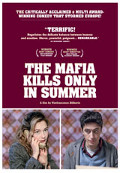
Italy 2013
Directed by
Pierfrancesco Diliberto
90 minutes
Rated M
Reviewed by
Bernard Hemingway

The Mafia Kills Only In Summer
Synopsis: A comedy about the Sicilian Mafia and a young boy growing up in Palermo in the 1970s.
The Mafia Kills Only In Summer is the serio-comic story of Arturo (as a child played by Alex Bisconti and as a adult by the director, Pierfrancesco "Pif" Diliberto) and his life-long love for Flora (as a child played by Ginevra Antona and as a adult by Cristiana Capotondi). It’s familiarly-themed stuff with the story being told by the adult Arturo as we follow his misadventures on the road to love but what makes it worthwhile is that that road passes through Palermo of the 1970s, through the 80s and into the 90s when a bloody war raged between the Italian State and the Mafia in Sicily. For all its fluffiness, the real heart of the film is its recognition of the many men, from investigating magistrates Giovanni Falcone and Paolo Borsellino to unknown foot-soldiers and ordinary citizens, who gave their lives to break the Cosa Nostra stranglehold on Sicilian life.
The linking device between these two parts of the story is Giulio Andreotti, the Italian Prime Minister of the time. As a boy the naive Arturo hero-worships Andreotti, who in real life was alleged but never proven to have ties with the Mafia (the film shies clear of addressing this directly but an Italian audience would no doubt take this as understood) to the point of dressing up as him at a fancy-dress party.
Opening with a scientifically dodgy representation of Mafia influence on his conception we follow Arturo’s story as he bumbles his way though life, never able to forget Flora. As the body count mounts gradually he comes to understand the reality of Mafia law - obey or die. Skilfully integrating real archival footage from the times with his own recreations Diliberto very effectively uses comedy to present the historical material.
At the film’s end Arturo takes his wife (yes, it’s Flora) and young son on a tour of the actual memorials put up to commemorate the dead. It’s lest-we-forget moment that packs a considerable punch.

Want more about this film?


Want something different?




